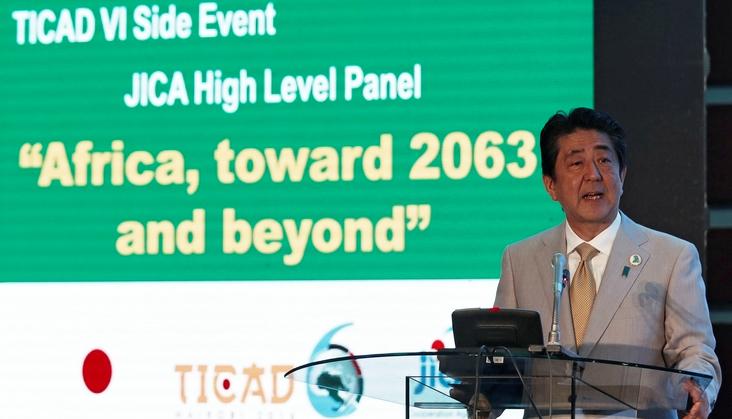Africa-Press – Lesotho. The resignation of Japanese Prime Minister Shinzo Abe will open a new chapter in the historic competition between Japan and China for resources and influence in Africa.
Abe’s departure due to ill health will not immediately mean dramatic change. His successor will be chosen from a list of Liberal Democratic Party (LDP) candidates that largely share his views on foreign policy, though perhaps not with the same hawkishness or determination.
Yet his departure could be a turning point that will make or break the long-term success of his initiatives in Africa. His successor faces a formidable task in trying to roll back Beijing’s influence in Africa.
China is the largest financier of African infrastructure, backing one out of every five projects and is Africa’s largest trading partner, with trade in 2016 totaling $114 billion.
Furthermore, Chinese President Xi Jinping promised in 2016 to invest $60 billion into Africa at the Forum on China-Africa Cooperation (FOCAC), while Japan could only contribute $30 billion.
Much of China’s success in Africa has been its foreign direct investments both in the public and private sectors. COVID-19 has made debt more of a concern and a liability for African countries.
China’s lending practices on the continent have been dubbed “debt trap diplomacy” where credit is extended to a debtor country with the intention of extracting concessions when it cannot sustain the loan payments.
Easy access to Chinese credit has sometimes been disastrous for some African economies. Zambia took out a series of loans to pay for airports, hospitals, and infrastructure, increasing the amount owed to China to a third of its external debt, and forcing the government to restructure.
Large infrastructure spending in Nigeria has prompted concerns that Lagos would lose some of its sovereignty in a dispute with China over loan repayment.
China backs 11 infrastructure projects in Nigeria totalling $3.1 billion or 11.2% of its external debt. An oil-panicked Japan first began seeking ties with Africa in the mid 1970s to stave off a flat-lining economy and increasing inflation.
With no other reasonable alternatives, it began to seek natural resource extraction from Africa. Japan increased development assistance from $5 million in 1972 to more than $900 million by 1991.
In the decades preceding Abe’s arrival, Japan launched the Tokyo International Conference on African Development (TICAD) in 1993 and began to focus on building schools, capacity building in a variety of fields, supporting good governance initiatives, and contributing to African human security.
But China’s emergence and competition soon overshadowed the Japanese. Using the framework of its Belt and Road Initiative (BRI), China’s presence in Africa is now ubiquitous, through roads, railways, textile factories, public infrastructure and industrial developments.
The bulk of Japan’s emphasis is on infrastructure development, essential in connecting emerging economies in Western and Southeast Africa and expanding African trade.
Japan has concentrated on areas of the continent in most need of connectivity, such as the Nacala Corridor that connects the Democratic Republic of Congo, Malawi, and Zambia by rail to the eastern deepwater port in Mozambique, giving regional farmers access to broader markets.
The East Africa Northern Corridor would connect east Africa to the eastern Port in Mombasa, Kenya to relieve cargo congestion in the region. Likewise, the West Africa Growth Ring connects Burkina Faso, Ghana, Benin, and Côte d’Ivoire with Nigeria. Abe’s approach has been to present Japan as more of an economic partner rather than a donor or creditor.
Japan seeks to distinguish itself from China by arguing that it would not seek to burden national partners with debt, seeking rather to jointly develop a more sustainable approach in line with the UN Sustainable Development Goals (SDGs) and Agenda 2063, endorsed by the African Union.
In that approach, sustainability is linked to capacity building, technical assistance, infrastructure, connectivity and trade expansion. Japan has also shown leadership and expertise where China has not, having a successful track record of developing sustainable public transport infrastructure.
Part of Abe’s success in Africa has been the formation of strategic partnerships, such as the signing of a $270mn loan deal with Kenya to boost the capacity of Mombasa port.
Japan has also made efforts to increase maritime security capacities in the Horn of Africa, working with Djibouti, a key access point to the Suez Canal.
Working in collaboration with India has put greater emphasis on the Asia-Africa Growth Corridor (AAGC), which emphasises areas that are critical to African economic and social development, such as health care, agriculture, food security, and disaster management.
Further, the AACG is an alternative mechanism for African countries to hedge against unnecessary risk, by reducing reliance on Chinese credit and development finance.
These efforts are not altogether altruistic, as Japan also hopes that its support to Africa will be rewarded by their support of its long-time efforts to reform the UN Security Council.
While it has been one of the largest UN donors, it has failed to achieve the required support for a permanent council seat, which it hope Africa’s 54 countries will help it to rectify.
There are still many obstacles to competing with China in Africa. Tokyo’s strategic reach compared to China is still massive, as the balance of direct investment by China approached the U. S. with $43b, while Japan stands at roughly $9b.
Japanese companies are often risk-averse to African conditions, noting that the business environment is not stable enough for Japanese companies, particularly for those without connections to local African companies.
A leading priority for Abe’s successor will be to define a risk-taking strategy that can convince African countries that Japan can rival or at least complement the financing that Beijing has to offer.
For More News And Analysis About Lesotho Follow Africa-Press






